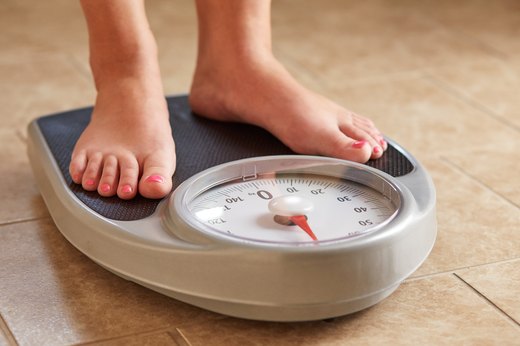https://www.livestrong.com/slideshow/13708842-wait-my-gut-health-is-sabotaging-my-workout/
If you’ve been putting in countless hours at the gym and the results just aren’t coming, or if you’re noticing a lack of motivation or decrease in performance in your fitness routine, your gut might be to blame. Although it’s often overlooked by most training regimens, a healthy gut is a key factor in reaping the benefits of your hard work.
Think about it: Your gut regulates your metabolism and digests and absorbs the nutrients that give you the energy to build muscle. That’s pretty important, whether you want to lose those last five pounds or are determined to set a new PR. Check out these telltale signs to see if your gut health may be sabotaging your fitness goals. And if you find out your gut isn’t working in your favor, keep reading until the end for some of the ways to boost your gut health and get it back on track.
1 Feeling Unmotivated
We all have times when we don’t feel up to a good ol’ sweat sesh. But if it keeps happening day after day after day, your gut might be impacting your brain and motivation levels. Yep, it’s true! Scientists have discovered that gut bacteria produce neurotransmitters. That means there’s a gut-brain connection that can affect your moods, motivation levels and self-discipline. So if you’re feeling a profound lack of motivation with no other apparent cause, a gut check may be in order (see #5 under What You Can Do).
2 Lack of Muscle Gains
The inability to hit a new personal record (PR) or increase the amount of weight you’re lifting can be related to poor gut health. Why? As previously mentioned, your gut plays a crucial role in whether you absorb the proper amounts of macronutrients, vitamins and minerals vital for muscle growth and any sort of physical development. If your gut isn’t properly absorbing nutrients from the food you eat, your body won’t sufficiently fuel your muscles during your workout or rebuild them afterward.

Think about it: Your gut regulates your metabolism and digests and absorbs the nutrients that give you the energy to build muscle. That’s pretty important, whether you want to lose those last five pounds or are determined to set a new PR. Check out these telltale signs to see if your gut health may be sabotaging your fitness goals. And if you find out your gut isn’t working in your favor, keep reading until the end for some of the ways to boost your gut health and get it back on track.
1 Feeling Unmotivated
We all have times when we don’t feel up to a good ol’ sweat sesh. But if it keeps happening day after day after day, your gut might be impacting your brain and motivation levels. Yep, it’s true! Scientists have discovered that gut bacteria produce neurotransmitters. That means there’s a gut-brain connection that can affect your moods, motivation levels and self-discipline. So if you’re feeling a profound lack of motivation with no other apparent cause, a gut check may be in order (see #5 under What You Can Do).
Read more: How to Find Your Motivation
2 Lack of Muscle Gains
The inability to hit a new personal record (PR) or increase the amount of weight you’re lifting can be related to poor gut health. Why? As previously mentioned, your gut plays a crucial role in whether you absorb the proper amounts of macronutrients, vitamins and minerals vital for muscle growth and any sort of physical development. If your gut isn’t properly absorbing nutrients from the food you eat, your body won’t sufficiently fuel your muscles during your workout or rebuild them afterward.
3 Reflux During Workouts
Acid reflux is never fun to deal with, and it can get even worse when working out. If you’ve ever been in the middle of a run and had to stop because of intense burning in your throat, you understand how uncomfortable it can be. The acidity in your stomach can get out of hand for many reasons, leading to digestive problems and reflux. Reaching for an antacid may help ease symptoms temporarily, but your main goal should be to get the gut bacteria and acid level back in harmony.
Read more: 10 Worst Foods for Acid Reflux
3 Constant Bloating
No one likes feeling bloated. Although it’s bound to happen from time to time, if you notice it regularly occurring after every meal or after eating certain foods, your gut may be trying to tell you something. Belly bloat is usually a problem with digestion. In the digestive tract, there are trillions of healthy and unhealthy bacteria that compete. When “bad bacteria” outweigh the good, an imbalance can lead to abdominal bloating and excessive gas (no one wants that during a spin class). A visit to your doctor will help you pin down the cause and get you on your way to feeling lighter!
Read more: 10 Ways to Beat Belly Bloat
No one likes feeling bloated. Although it’s bound to happen from time to time, if you notice it regularly occurring after every meal or after eating certain foods, your gut may be trying to tell you something. Belly bloat is usually a problem with digestion. In the digestive tract, there are trillions of healthy and unhealthy bacteria that compete. When “bad bacteria” outweigh the good, an imbalance can lead to abdominal bloating and excessive gas (no one wants that during a spin class). A visit to your doctor will help you pin down the cause and get you on your way to feeling lighter!
Read more: 10 Ways to Beat Belly Bloat

4 Unintentional Weight Gain
Sure, there are times when working out causes the scale to go up because of muscle gain. But you also know when something just isn’t right. There are two main ways your gut impacts your weight, even if you are eating right. First, your gut affects your metabolism. If your gut flora are in rough shape, your metabolism likely is as well. Second, when your gut isn’t functioning properly, other body systems get knocked out of whack too. This can make for some shocking weigh-ins. Rest assured, a few lifestyle changes can get your goals back on track.
What You Can Do
With all the wonderful things our gut does for us, the least we can do is keep it in tip-top shape. It will totally return the favor! The good news is that you can pay closer attention to your gut health and start reaping the benefits today. Proper diet and exercise will get you going, and probiotic foods will help take it further. Make sure to get in some good “you time” and work on stress reduction — your gut will be thanking you in no time. Here are five gut-strengthening tips!
1 Avoid Stress
OK, this is easier said than done. But if your gut health is a priority, try to rid your life of as much stress as you can. Stress is a known “gut destroyer” because of how sensitive to emotion the gastrointestinal tract is. A troubled intestine can send signals to the brain, just as a troubled brain can send signals to the gut. To help ease life’s stressors, opt to take a yoga class, get out into nature, practice slow and mindful breathing or focus on positive things like gratitude and thankfulness.
2 Limit Refined and Processed Foods
Avoiding sugar is especially helpful in shifting the gut bacteria balance toward more health-promoting bacteria, creating a less acidic environment. Sugar can cause an overgrowth of yeast, which is linked to increased permeability in the intestinal lining. In addition, eliminating or limiting refined and processed foods in your diet will give your gut a chance to heal. Many of these foods contain chemicals that have the potential to damage the intestinal lining. Try to consume whole, organic foods that fuel the body.
3 Eat Fermented and Probiotic Foods
Sauerkraut isn’t just for hotdog toppings! Fermented foods can be added to anything from salads to potatoes, and consuming foods with lots of gut-healthy probiotics like sauerkraut, kefir, kimchi and yogurt will help to raise the amount of “good bacteria,” thus boosting overall health and performance — including weight-loss.
Read more: 13 Surprising and Beneficial Probiotic Foods
4 Keep It Moving
Walking, Zumba, weightlifting or CrossFit: The gut isn’t partial to what you’re doing; it just wants you to exercise. Regular exercise cuts down on inflammation, which is known to wreak havoc on your gut flora. Not only will you be burning calories, but you’re creating an anti-inflammatory environment for your microbes. Just remember to exercise safely and stay hydrated!
5 See a Specialist
If you’ve made healthy lifestyle changes but your symptoms still persist, it may be time to call in the experts. Make an appointment with your doctor who can refer you to a gastroenterologist if necessary. A gastroenterologist can help diagnose and treat underlying GI conditions. Or if you suspect something in your diet is to blame (or your doc suspects you might have food sensitivities), you may also want to see a registered dietician nutritionist (RDN) who can help you figure out a way of eating that works for you and your gut.





